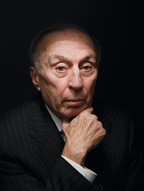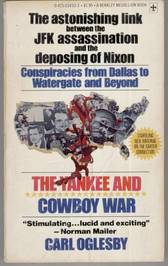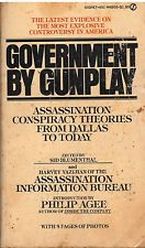AN ESSAY BY RICHARD BARTHOLOMEW  "The forces that killed Kennedy wanted the message clear: 'We are in control and no one — not the President, nor Congress, nor any elected official — no one can do anything about it.' It was a message to the people that their Government was powerless." - Vincent J. Salandria (1975) quoted by Gaeton Fonzi, The Last Investigation (1993) Vincent Salandria was right, and that message by the forces who killed Kennedy has become more clear, having been reinforced by the deep political events since Kennedy's death. Most presidents, members of Congress, and other elected and unelected officials have accepted that message and have done nothing to resist its tyranny. But not all.[1] Some of the resisters failed to get elected. Others failed to survive in office. They were killed, or blackmailed, or bribed, or conned, or scandalized, or frightened into stopping any further attempts to do damage to the Deep State. But not all. The next president must be a resister and a survivor who will oversee the full release of all of the files on the JFK assassination in 2017. But who among the 2016 candidates is that? It is not a matter of political advocacy, of being for or against a party or candidate in a corrupted election. We only defeat the Gordian Knot by refusing to untie it. It is a matter of explaining better the existing deep political reality using all of the evidence. In my view there is only one who meets the necessary criteria. This is my case for Hillary Rodham Clinton. To avoid anachronistic thinking, I try to consider what a resister would do today. For the sake of survival, such a person could not repeat the careers of John or Robert Kennedy. They resisted but did not survive. The challenge for a post-1968 candidate is to survive while resisting. The electorate is trained not to talk about the politics of assassination, but it is always the elephant in the room. Such a person would spend a lifetime becoming a viable candidate, and do whatever it takes to survive. The Kennedys, mostly Joseph P. Kennedy, knew the electoral realities in 1960. I think we have been repeating Kennedy vs. Nixon in major ways ever since. Power goes to the faction who can steal it, or foil the theft. The presidency is tough to infiltrate. But if our government's usurpers can do it repeatedly, so can its protectors and defenders. The big question is, can critical observers see the vague outlines of this battle of shadowed titans? I think so. It is necessary to distinguish the shopkeepers from the extortionists. Because there exist resisters like Libero Grassi, the shopkeeper from Palermo who wrote an open letter to an anonymous "Dear Extortionist." It rocked the boat, and Grassi was soon dead. But there are also "shopkeepers" who both resist and survive, like "Donnie Brasco" and "Bob Musella," who successfully infiltrated organized crime families and cartels. A modern-day Deep State resister/survivor would disingenuously act in the interest of the billion-dollar oligarchs, who finance political adventurism, in order to get into power, because it is the only way in a political system that clearly lacks legitimacy. The Clintons know not only the deep politics of assassination, they know something important that most candidates do not: how to get elected and survive in office while doing real damage to the Deep State. Their history shows two victories against the Deep State that stand above the rest. President Clinton's greatest legacy is the Assassination Records Collection Act, which apparently would have died in its infancy if not for his intervention. First Lady Clinton's greatest legacy is Travelgate, her much misunderstood attempt to protect her husband from Deep State assassins. There is a prehistory to those victories that can be seen by connecting the dots. During a 1992 campaign appearance with Bill Clinton in McKeesport, Pennsylvania, Clinton's running mate Albert Gore said he believed that President Kennedy was killed by a conspiracy of unknown origin and that all federal files should be opened to the public.[2] In his acceptance speech at the Democratic convention on July 16, 1992, Clinton paid tribute to the memory of his former Georgetown professor, Carroll Quigley. What a presidential candidate says in a speech at a national party convention is always symbolically significant, and never more so when the candidate is the party's nominee. Carroll Quigley of Georgetown University was a conspiracy historian and an insider of the organizations that created the world's Deep States.[3]  I think the key to understanding Hillary Clinton is not her feelings for Wall Street or Wal-mart, but for Carl Oglesby and Sidney Blumenthal, mutual associates of the Assassination Information Bureau. From the late 1960s until his death in 2011, Clinton had a warm acquaintance with Carl Oglesby, author of the 1975 classic of JFK assassination literature, The Yankee and Cowboy War. His political writings had a life-changing effect on her as a college student. Oglesby also founded the Assassination Information Bureau (AIB). They kept their friendship quiet for obvious political reasons.[4] Sidney Blumenthal, one of the Clintons' oldest, most trusted, and loyal friends and confidantes was also an acquaintance of Oglesby. With AIB founder Harvey Yazijian, Sidney Blumenthal co-edited Government by Gunplay: Assassination Conspiracy Theories from Dallas to Today, the classic 1976 anthology on the assassinations of JFK, RFK, MLK and Fred Hampton. Blumenthal's book, for which he wrote the forward and epilogue, and contributed two articles, includes an introduction by CIA whistleblower Philip Agee, Robert Groden's "A New Look at the Zapruder Film," and "includes the work of Peter Dale Scott, William Turner, Jeff Gerth, Carl Oglesby, Jerry Policoff...L. Fletcher Prouty and Allard Lowenstein, who himself was assassinated."[5]  In the Clinton White House, Rahm Emanuel gave Blumenthal a special nickname because he kept pointing out hidden plots. As Carl Bernstein put it in his 2007 biography of Clinton, A Woman in Charge (p. 490), "Presidential aide Rahm Emanuel had given Blumenthal the nickname 'G.K.,' for Grassy Knoll, suggesting conspiracy theories on a scale with John Kennedy's assassination." In May 2015, after their email exchanges leaked regarding Syrian intrigues, Hillary Clinton had to publicly play them down, saying it was her desire to listen to diverse opinions. Oglesby, who stayed publicly linked to conspiracy, had to distance himself as Clinton's early political influence and acquaintance. Blumenthal, who is publicly known as her longtime close friend, has to distance himself from conspiracy analysis. As a result of these mutual acquaintances and friendships, Hillary knew exactly what she was talking about when she coined the term "Vast Right-wing Conspiracy" at the time of her husband's impeachment.[6] In the first four days of his first term, President Clinton, or an alert aide, may have saved the Assassination Records Collection Act, and the investigative body that it mandated, from expiring prematurely. I recall pessimistic discussions at that time by researchers of deep politics that the act has a clever self-destruct clause which states, "The President shall make nominations to the Review Board not later than 90 calendar days after the date of enactment of this Act." It was suspected that President Bush's signing the act into law on October 26, 1992 set an impossible deadline for nominations on January 24, a Sunday, only four days after Clinton was sworn into office. Establishing the Review Board was delayed for 15 months, and Congress did not fund its operations until October 1994. Until then, it was funded solely from the Clinton White House budget. These and other delays by federal agencies threatened the completion of the Board's work by the act's mandated three-year deadline, requiring a resolution from Congress granting another year which had to be signed into law by Clinton. Thanks largely to these necessary interventions from President Clinton, the act was saved, allowing the last major inquiry of the assassination to proceed. It succeeded in releasing nearly all of the remaining assassination documents, which further proved the conspiracy. It is easy to see how an apathetic or hostile White House could have prevented that success.[7] President Clinton had reason to be concerned for his personal safety when he said at a 30th anniversary press conference that he thought JFK was killed by a single assassin and he (Clinton) was satisfied with his own security arrangements.[8] The all-but-forgotten intrigues which occurred between the time of Travelgate and the death of Vince Foster are vastly important considerations in the deep politics of Clinton's public statements. On May 19, 1993, one of Clinton's presidential helicopters crashed in the morning, followed that afternoon by Vince Foster's involvement in the firing of the White House Travel Office staff of Bush holdovers (aka Travelgate). Scott Reynolds, William Barkley, Brian Hassley and Tim Sabel, who died in the crash, reportedly had served as Clinton bodyguards. The crash site, near Quantico Virginia, was reportedly closed to the press and a video of the crash site, taken by a fire fighter, was seized by military officials.[9][10] I personally recall that the crash was the top story that morning on CNN, but it strangely disappeared after the travel office firings dominated the news, despite the glaring fact that the job of the White House Travel Office was to book flights on presidential aircraft. The connection between those two events remains a deafening silence. The night of Vince Foster's "suicide," two months after the firings, it was the eve of his trip to Denver on Clinton's behalf to meet with an attorney about Travelgate. Foster's widow told Esquire magazine that Travelgate had been her husband's preoccupation since it happened.[11] In his eulogy, President Clinton called Foster "a great protector" of his friends, adding, "We could never remember a time when he ever asked us to protect him — it was always the other way around." [12] Carl Bernstein wrote in A Woman in Charge that "The president was concerned about how Foster would react to the [July 19 Wall Street Journal] editorial [linking Foster and Hillary to the Travel Office firings], and called to invite him to a White House movie screening of In the Line of Fire (strangely, about a would-be presidential assassin and a heroic Secret Service agent) that night. Foster declined...." (p. 340) In her first meeting with Webb Hubble, one of her closest friends, after Foster's death, and after their consoling words to each other, "Hillary then changed the subject to ask for some help regarding a rumor she had heard that before his death Foster had been investigating a group of assassins who worked for the Navy and made their victims look as though they'd committed suicide. She said that the president had already been approached by a reporter about it." (p. 343) "After Vince's death, she 'found more to judge as evil,' [old friend Dick] Atkinson could see. 'There seemed to be something basic that was reinforcing her view of good and evil, an element of embitterment there, and the notion of conspiracy." (p. 346)  At her own campaign appearance at the University of Tennessee in Nashville on January 29, 2008, candidate Hillary Clinton said, when asked, that she would do everything she could as president to release the remaining classified JFK assassination files.[13] The forces who killed President Kennedy continue to send a clear message that we are powerless to stop them. But we have never been completely powerless. We have long had enough proof of the conspiracy and conspirators. What we do not yet have is the power to force the usurpers of our government to give us the final details of their conspiracy. Criminal science teaches that the best way to combat a conspiracy is to infiltrate it successfully. When viewed from that perspective, the Clintons appear to be doing that, and doing it well. If the Clintons retake the White House and continue to survive, the final test of this perspective will be the final deadline in the Assassination Records Collection Act: October 26, 2017. It is the day all remaining withheld records on the Kennedy assassination will be released unless the president, and only the president, decides otherwise. It is also Hillary Rodham Clinton's 70th birthday. Copyright © 2015-2016 Richard Bartholomew, All Rights Reserved Notes:
1. Rex Bradford, "Whispers from the Silent Generation," Speech delivered at November in Dallas Conference, May 2013 http://www.maryferrell.org/pages/Essay_-_Whispers_from_the_Silent_Generation.html 2. Los Angeles Times, July 20, 1992. 3. Daniel Brandt, "Clinton, Quigley, and Conspiracy: What's going on here?," NameBase NewsLine, No. 1, April-June 1993 http://www.namebase.org/news01.html 4. James V. Grimaldi, "Clinton Quiet About Own Radical Ties," Washington Post, May 19, 2008 http://www.washingtonpost.com/wp-dyn/content/article/2008/05/18/AR2008051802101.html 5. Bill Kelly, "Max the Hack is Back" JFKcountercoup, June 15, 2015. http://jfkcountercoup.blogspot.com/2015/06/max-hack-is-back.html 6. Carl M. Cannon, "'Far-right conspiracy' a gift from Blumenthal Clinton adviser valued for his journalism past," Baltimore Sun, February 15, 1998. http://articles.baltimoresun.com/1998-02-15/news/1998046033_1_aide-sidney-blumenthal-white-house-al-gore Max Holland, "'Grassy Knoll' Sid: Hillary's Personal Conspiracy Theorist," Washington Decoded, June 11, 2015. http://www.washingtondecoded.com/site/2015/06/blumenthal.html#fn3 7. President John F. Kennedy Assassination Records Collection Act, 44 U.S.C. ch. 21 § 2107, Sec. 7(b)(2) http://www.gpo.gov/fdsys/pkg/STATUTE-106/pdf/STATUTE-106-Pg3443.pdf;https://en.wikipedia.org/wiki/President_John_F._Kennedy_Assassination_Records_Collection_Act_of_1992; http://spartacus-educational.com/JFKassboard.htm Final Report of the Assassinations Records Review Board, September, 1998. ch. 2, Sec. B. http://www.fas.org/sgp/advisory/arrb98/part04.htm 8. David E. Rosenbaum, "30-Year Commemoration In Dallas and Arlington," New York Times Nov. 23, 1993, p. A16. http://www.nytimes.com/1993/11/23/us/30-year-commemoration-in-dallas-and-arlington.html 9. Unsolved Mysteries Wiki, "US Marine Corps Helicopter Crash" http://unsolvedmysteries.wikia.com/wiki/US_Marine_Corps_Helicopter_Crash 10. Wikipedia, "White House travel office controversy," http://en.wikipedia.org/wiki/White_House_travel_office_controversy 11. Gregory Jaynes, "The Death of Hope," Esquire, November 1993, Vol. 120 Issue 5, p. 85.http://archive.esquire.com/issue/19931101 http://connection.ebscohost.com/c/articles/9402150567/death-hope 12. Paul Richter, "Clinton Eulogy Recalls Friendship With Foster," Los Angeles Times, July 24, 1993. http://articles.latimes.com/1993-07-24/news/mn-16379_1_white-house-aides 13. "Hillary Clinton Called for Release of JFK Files," JFK Facts, October 28, 2015. http://jfkfacts.org/hillary-clinton-called-for-release-of-jfk-files/
0 Comments
Your comment will be posted after it is approved.
Leave a Reply. |
AuthorThis is Joe Green's blog. Archives
August 2021
Categories |
 RSS Feed
RSS Feed
